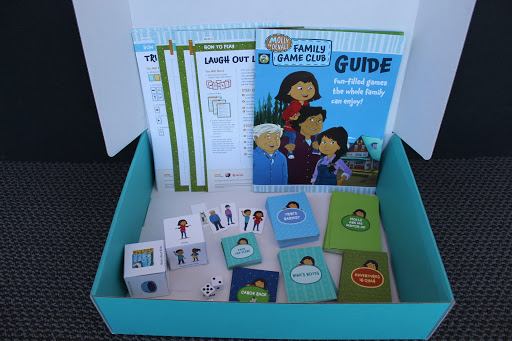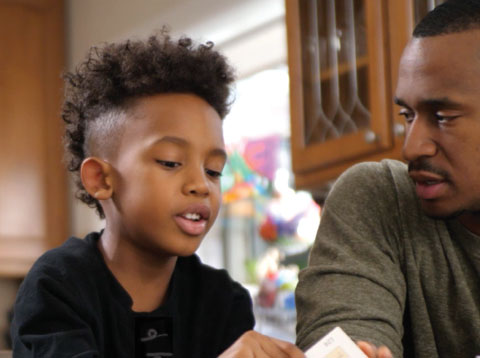“MOLLY OF DENALI celebrates life in a rural community—a unique one, but rural all the same. Having that commitment to rural representation carry over into the educational resources is tremendously gratifying. And, the fact that families from rural communities across the US had a hand in their creation added both value and authenticity.”—Stephanie McFadden, Alaska Public Media
More than 9.3 million, or nearly one in five students in the United States, attend a rural school (Why Rural Matters 2018-19: The Time is Now), yet the majority of educational initiatives and materials have not been specifically designed to reflect and meet the unique needs of this sizable audience. With this population in mind, GBH, the producers of the MOLLY OF DENALI series, assembled a development team that included five partner public media stations that serve large rural audiences, Alaska Native collaborators, literacy experts, and parents. Together, this team used a human-centered design approach to create the MOLLY OF DENALI Family Game Club, a new educational resource developed with and for families in rural communities that celebrates at-home learning, family history, and spending time together. The Center for Program Evaluation at the University of Reno, NV conducted an evaluation of the Family Game Club.

Project Background
Funded by the Corporation for Public Broadcasting, the Family Game Club was created as part of the MOLLY OF DENALI Rural Education Initiative. The goal of the project was to develop educational materials that amplify the voices of rural communities and are inspired by MOLLY OF DENALI, the Peabody Award-winning animated action-adventure comedy aimed at 4–8-year-olds. Set in Alaska, the series follows the adventures of curious and resourceful 10-year-old Molly Mabray, an Alaska Native girl. With an emphasis on family as well as intergenerational and community relationships, MOLLY OF DENALI models Alaska Native values, such as respecting others, sharing what you have, and honoring your elders, values shared by many other cultures. It also showcases contemporary aspects of rural life including strong female role models, interdependence with nature, and using technology to research, learn, and communicate.
The development team was committed to practicing human-centered design, an inclusive process “that starts with the people you’re designing for and ends with new solutions that are tailor-made to suit their needs” (IDEO Design Kit). In this vein, public media station staff conducted interviews with parents in rural communities across the United States to better understand some of the challenges they face and preferences they have when it comes to educational materials and family time at home and in the community. The development team learned that factors such as limited access to strong and reliable broadband and geographic isolation affect families’ ability to access digital tools and content and attend events requiring long car trips, making non-digital, at-home or in-community activities a high priority. The team used this information to inform the ideation, iteration, and production of prototype games that were shared with families through two rounds. The development team then took the game prototypes with the greatest promise and appeal and developed the Family Game Club.
MOLLY OF DENALI Family Game Club

The MOLLY OF DENALI Family Game Club consists of 16 indoor and outdoor games, including competitive and cooperative games, storytelling, movement, card, and board games. The games are geared toward families with children in grades K-2, and they promote engagement around informational text (text whose primary purpose is to convey information) and social studies. The games reinforce literacy; strengthen social studies content knowledge; give families the opportunity to practice and hone problem-solving and critical thinking skills; and provide ways that kids, friends, and families can have fun together. As families learn about Molly, her community, and Alaska Native values, they are encouraged to reflect on their own family history and culture. In addition to the games, the Club includes a colorful family guide that provides information about the games, as well as background about the MOLLY OF DENALI television series, geography and wildlife of Alaska, and Alaska Native values and culture.
Distribution and Implementation of Materials
The five partner public media stations serving rural communities worked with local organizations such as schools and libraries to distribute the Family Game Club boxes to families. Each station collaborated with a specific rural community in this effort. Some partnerships were built on existing relationships; others used the project as an opportunity to connect with a new organization or town in their viewing area. Families played the games at home and then were invited to attend a culminating event which celebrated their community, spending time together, and MOLLY OF DENALI.
Evaluation Study
In addition to the formative evaluations that occurred during prototype development, the team worked with an external evaluator to gather summative feedback. The Center for Program Evaluation at the University of Nevada-Reno conducted an evaluation with over 200 families to measure (1) the reach of the project in the five partner communities, (2) changes in parents knowledge, attitudes, and practices related to using media-focused resources, (3) changes in children’s use of informational text and knowledge of targeted social studies concepts, and (4) successes and challenges of implementing the Family Game Club. Parents and children used the Family Game Club materials for four weeks and tracked their usage and enjoyment using checklists, as well as filled out pre- and post-surveys. Additionally, a subset of families participated in parent and child focus groups.
Results from the evaluation study include:
- The Family Game Club increased children’s knowledge of informational text and targeted social studies concepts. Comparing pre- and post-test responses, there was a statistically significant difference in children’s informational text and social studies knowledge scores, including recognizing informational text, using a map, and recognizing activities popular in Alaska Native communities.
- Families enjoyed playing games together. Parents and children both reported that they enjoyed playing the games quite a bit or a lot and would play them again after the study concluded. Some 93% of parents would recommend the Family Game Club to other families, and 80% of children said they would play the games again.
- Families increased the amount of time they played together. On the post-survey, 58% of parents reported playing games with their children more than once a week. One parent shared, “I learned that I do have time. It doesn’t take that much time to sit down and get through a game and have that family time.”
- Families had very positive feedback about the games. Many parents felt the games were fun, educational, and high-quality. All of the games received at least an 83% positive rating, indicating overall high satisfaction with the games. A parent shared: “[The Family Game Club] exceeded my expectations. Every week there was excitement of what the games would be…. I liked that you had to use your imagination more instead of the regular games we play at home.”

In Summary
The MOLLY OF DENALI Family Game Club is an example of educational materials that have been designed with and for families living in rural communities to address their unique challenges. By using human-centered design, and directly interviewing and involving parents from rural communities, the team was able to effectively address some of the barriers they face and the preferences they have for the types of resources they want to use during family time. Not only is the Family Game Club engaging, educational, and celebrates the values of many rural communities, but it also helps to increase children’s knowledge of informational text, social studies, Alaska geography and wildlife, and Alaska Native culture. Families spoke, and Team Molly listened–while families in rural communities are rarely part of the development process, this team made sure that the opinions and perspectives of families in rural communities were incorporated into the resources. With additional funding, GBH is excited to revise the Family Game Club materials and partner with additional public media stations to distribute the materials to families across the United States.
Acknowledgments
GBH would like to thank the Corporation for Public Broadcasting for its generous funding. GBH would also like to thank the following organizations and individuals: Alaska Public Media, Blue Ridge PBS, Mountain Lake PBS, PBS Reno, Prairie Public Broadcasting, Center for Program Evaluation at the University of Nevada-Reno, Alaska Native collaborators, and families who participated in the prototype testing and summative evaluation study.
 Mollie Levin is a Senior Project Manager, Early Childhood at WGBH Educational Foundation. Her current projects include overseeing the development of educational materials using an inclusive, participatory approach, and launching an early childhood initiative that focuses on supporting new immigrant children and their families. Her previous experience includes producing STEM apps for preschoolers at GBH, as well as researching and developing new coding technologies for early childhood settings at the DevTech Research Group at Tufts University. Mollie received both her Master’s Degree and Bachelor’s Degree from the Eliot-Pearson Department of Child Study and Human Development at Tufts University.
Mollie Levin is a Senior Project Manager, Early Childhood at WGBH Educational Foundation. Her current projects include overseeing the development of educational materials using an inclusive, participatory approach, and launching an early childhood initiative that focuses on supporting new immigrant children and their families. Her previous experience includes producing STEM apps for preschoolers at GBH, as well as researching and developing new coding technologies for early childhood settings at the DevTech Research Group at Tufts University. Mollie received both her Master’s Degree and Bachelor’s Degree from the Eliot-Pearson Department of Child Study and Human Development at Tufts University.


